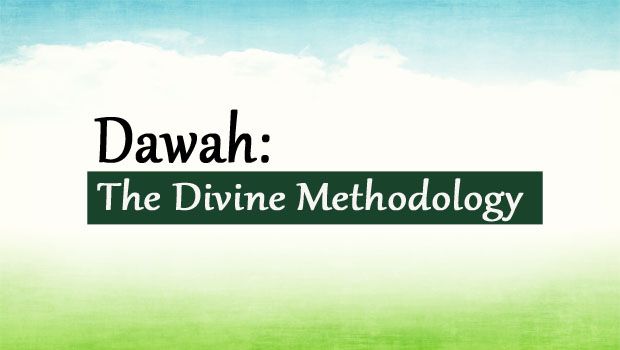Dawah, calling people to Allah and His religion, is an obligation upon every Muslim man and woman. The Holy Quran tells us dawah is one of the most important acts and is loved by Allah (subhanahu wa ta’ala – glory to Him, the Exalted; SWT). It is the practice of His Prophets (peace be upon them), the chosen servants of Allah who struggled in order to convey Allah’s message to people despite afflictions and hardships. While doing so, they were often insulted and persecuted. But they demonstrated patience and steadfastness. Whenever they faced hostile reaction from their people, they followed the divine methodology in their dawah effort and repelled the animosity in the best possible manner. They demonstrated nothing but the highest moral character.
Dawah is also the sunnah (practice) of Prophet Muhammad (peace be upon him; pbuh), as enjoined by Allah SWT in the Quran: “O Prophet! Truly We have sent you as a witness, a bearer of glad tidings, and warner. And as one who invites to Allah by His permission, and as a lamp spreading light” (Quran 33:45-46). The Messenger of Allah (pbuh) worked in the most difficult circumstances and gave a practical demonstration of excellence in moral character during his dawah effort. He did everything possible to convey Allah’s message despite the most challenging and antagonistic reactions from the Makkan pagans. He remained firm, patient, and confident of Allah’s help and the ultimate victory in conveying the message.
Responsibility of All Muslims
Allah commands the believers to do whatever they can, according to their circumstance and ability, to spread His message. He made the Muslim ummah (community), both individuals and groups, responsible for this noble cause: “Invite to the Way of your Lord with wisdom and fair preaching, and argue with them in a way that is better. Truly, your Lord knows best who has gone astray from His Path, and He is the best aware of those who are guided” (Quran, 16:125). And in another verse, “Let there arise out of you a group of people inviting to all that is good, enjoining what is right and forbidding what is wrong. And it is they who shall attain to happiness” (Quran 3:104). We see that the Quran instructs us to give dawah with wisdom, to take an approach of kindness and tactfulness, that this is a key to success. Hikmah (wisdom) is a gift from Allah. “He grants wisdom to whomever He wills, and he to whom the wisdom is granted, is indeed granted abundant good. But none bears this in mind except those of understanding” (Quran 2:269). And certainly by following the sunnah of Prophet Muhammad (pbuh), we find excellent examples of moral, wise, and kindly behavior. “Indeed in the Messenger of Allah you have a good example for any whose hope is in Allah and the Last Day, and remembers Allah much” (Quran 33:21).
Good communication skills and presentation style help make one’s dawah effort successful. Allah commanded Moses (pbuh) to adopt a soft and mild approach when He sent him, along with his brother Aaron, to Pharaoh. “Go both of you, to Pharaoh. Verily he has transgressed. And speak to him mildly, perhaps he may accept admonition or fear Allah” (Quran 20:43-44). Among the most essential qualities required during dawah work is that of patience and steadfastness. “And be patient; verily Allah wastes not the reward of those who do good” (Quran 11:115). And we are told in another verse to practice tolerance in the face of hostile or abusive challenges from those who don’t believe, “And be patient over what they say and avoid them with gracious avoidance” (Quran 73:10). And further, “And endure patiently, for your patience is but from Allah; nor grieve over them, and be not distressed because of their plots” (Quran 16:127).
If a daa’i follows the divine set of guidelines and applies Quranic manners as demonstrated by the Prophet (pbuh), Allah guarantees success for him for He always helps those who help His cause.
A daa’i should, therefore, develop necessary skills that help him carry out his work in all circumstances and try to maintain a purely practical approach. In case of a hostile reaction, the daa’i must be well-prepared to face any possible situation including those who mock or insult him. Regardless of how poorly others may act, he must demonstrate the most moral and high-minded behavior at all times. The Prophet (pbuh) said: “The best among you are those who possess the best manners” (Al-Bukhari and Muslim). He also said, “I have been sent to bring good behavior to the highest perfection” (Musnad Ahmad).
The daa’i must also be able to forgive people and excuse those who treat him badly: “Show forgiveness, enjoin what is good, and turn away from the foolish” (Quran 7:199). While this is not easy, it is essential. “And the servants of the Most Gracious are those who walk on the earth in humility, and when the foolish address them, they say [words of] peace” (Quran 25:63). A daa’i must show kindness and mercy in all his actions and endeavors. The Prophet Muhammad (pbuh) said: “Whoever is devoid of kindness and mercy, is devoid of all goodness” (Abu-Dawoud). And, of course, in order to become a successful daa’i, one must possess sound aqidah (beliefs) and put his faith into practice with sincerity and devotion and discharge all obligations due to Almighty Allah. It is necessary to make his intention only to please Allah. “Actions are governed by intentions. Everyone is rewarded for that which he intended,” the Prophet (pbuh) said. Further, a daa’i has to make sure he abstains from whatever is forbidden. And he must completely stay away from riya (showing off). Development of strong conviction and strength in speaking the truth without fear or hesitation is also needed. The habit of effective control over anger, desires, and temptations will help make the daa’i a a sincere and inspiring example to others. Abu Hurairah narrated the Prophet (pbuh) as having said: “A strong person is not he who can overpower his rival in wrestling, but rather he who controls himself when roused to anger” (Al-Bukhari, Muslim). It is also necessary to practice faith in all sincerity before the daa’i decides to invite others to Islam. Therefore, all those interested in giving dawah must present themselves as outstanding examples of practicing what they preach: Allah SWT says: “O you who believe! Why do you say that which you do not do? Most hateful it is with Allah that you say that which you do not do” (Quran 61:2-3).
It is extremely important also for the daa’i to obtain necessary knowledge and training in order to plan a logical, well-organized, and mature dawah strategy. Sufficient knowledge of the people and area where he will give dawah is necessary. He should be well prepared and knowledgeable enough to support his points with Quranic verses and hadith of the Prophet (pbuh). Any dawah activity without a mature strategy and careful planning may lead to unproductive debates and unnecessary arguments, and might result in hurting people’s feelings or alienating them. This would be harmful rather than useful and productive.
Divine Methodology Examples in Dawah
In order to see the application of this divine methodology in a practical sense, let’s examine a few examples from the Quran. Allah narrates the story of Prophet Noah (pbuh) who with humbleness, patience, and great determination conveyed Allah’s message to his people: “Indeed We sent Noah to his people and he said, ‘O my people, worship Allah. You have no other god but Him. I fear for you the torment of a great Day’” (Quran 7:59). His people mocked and abused him, accusing him of misrepresenting himself as a messenger from God: “The leaders of his people said, ‘Verily we see you in plain error’” (Quran 7:60). Prophet Noah answered them with wisdom and beautiful preaching: “O my people there is no error in me. But I am a Messenger of the Lord of mankind” (Quran 7:61). He explained his mission in simple words and informed them of his responsibility to convey Allah’s message, and did not engage in unnecessary argument: “I convey unto you the messages of my Lord and give sincere advice to you. And I know from Allah what you know not” (Quran 7:62).
We find another beautiful example in Prophet Hud’s story (pbuh): “And to [the tribe of] ‘Ad [We sent] their brother Hud. He said: ‘O my people, worship Allah. You have no other god other than Him. Will you then not fear [Allah]’”? (Quran 7:65). Hearing this, his people belittled him and called his integrity into question: “The leaders of those who disbelieved among his people said: ‘Verily we see you in foolishness, and verily we think you are one of the liars’” (Quran 7:66). In the face of these denunciations, Hud stood firm and showed himself as a perfect model of patience and self-restraint. He answered them with straightforward and elegant simplicity: “O my people! There is no foolishness in me, but I am a Messenger from the Lord of mankind” (Quran 7:67). Then he explained his mission: “I convey unto you the Messages of my Lord, and I am a trustworthy adviser to you” (Quran 7:68).
We have another example in Prophet Shuaib’s story (pbuh). When he invited them to listen to Allah’s message, they attacked his character and mocked him, telling him that he was the only one who forbears faults and the only right-minded person, saying this in a sarcastic way. “They said, ‘O! Shuaib! Does your prayer command that we give up what our fathers used to worship, or that we give up doing what we like with our property? Verily, you are the forbearer, right-minded!’” (Qur’an 11:87). Shuaib (pbuh) did not lower himself to their level because he knew his mission and responsibility. He tried to explain the right way to worship Allah and bring them to right path. Here he showed a remarkable amount of patience and highest individual character. He informed them about his motive and method in his dawah work. He also expressed how much he needed Allah’s help and support in carrying out his responsibility. “I only desire reform to the best of my power. And my guidance cannot come except from Allah. In Him I trust and unto him I repent” (Qur’an 11:88).
In the story of Prophet Abraham (pbuh) we notice that he adopted a mature and logical approach when he talked to his people. He was simple, focused, and to the point. He wanted them to really think about and apply their own wisdom so as to analyze what they worshipped. He explained the true concept of lordship and informed them that the Lord possessing absolute authority and control over the entire universe is the one and only god worthy of being worshipped. Through dawah, he actually challenged their concept of lordship and informed them that Allah is the only and absolute giver of sustenance. He also explained about the life of the Hereafter: “And Abraham – behold, he said to his people, ‘Serve Allah and fear Him: that is better for you if you did but know. You worship beside Allah only idols, and you only invent falsehood. Verily, those whom you worship besides Allah have no power to give you provision. So seek your provision from Allah alone, and worship Him alone, and be grateful to Him. To Him alone you will be brought back’” (Qur’an 29:16-17).
The Prophet’s (pbuh) Manners in Dawah
The above verses demonstrate so well the depth of maturity, common sense, and wisdom a daa’i must have. There are countless examples of this in the life of Muhammad (pbuh) but we can take one incident to show his exemplary manner in dealing with others, which oftentimes, is the best, indirect, dawah. The following is an excerpt from “The Sealed Nectar,” a biography of Muhammad (pbuh) by Safiur Rahman Mubarakpuri. The Treaty of Hudaybiah was being signed by Prophet Muhammad (pbuh) and a representative of the Quraish, the people of Makkah: “When the agreement was to be committed to writing, Ali Bin Abi Talib, who acted as a scribe, began with the words: Bismillah-ir-Rahman-ir-Rahim, i.e. ‘in the name of Allah, the most beneficent, the most merciful’ but the Makkan plenipotentiary, Suhail Bin Amr, declared that he knew nothing about Ar-Rahman and insisted upon the customary formula ‘Bismika-Allahumma’, i.e., ‘In your name O Allah!’ The Muslims grumbled with uneasiness but Prophet Muhammad (pbuh) agreed. He then went on to dictate, ‘This is what Muhammad, the Messenger of Allah has agreed to with Suhail Bin Amr.’ Upon this Suhail again protested: ‘Had we acknowledged you as a Prophet, we would not have debarred you from the sacred House, nor fought against you. Write your own name and the name of your father.’ The Muslims grumbled as before and refused to consent to the change. The Prophet (pbuh), however, in the larger interest of Islam, attached no importance to such an insignificant detail, erased the words himself, and dictated instead: ‘Muhammad, the son of Abdullah.’”
The above incident is a beautiful example to show that as daa’i ila-Allah, (one who calls to Allah), Prophet Muhammad (pbuh) not only possessed, but also demonstrated in a practical sense, all the personal characteristics and skills necessary for successful dawah. Therefore, he was able to resolve a most delicate situation to the satisfaction of all. Here we see him as a daa’i and perfect strategist. He adopted a purely practical approach, full of wisdom. Prophet Muhammad (pbuh) showed time and again the patience, steadfastness, understanding of people, tolerance, and compassion that are required to call people to Allah’s religion. His character, interpersonal skills, and communication abilities were the cornerstones of his success. If a daa’i follows the divine set of guidelines and applies Quranic manners as demonstrated by the Prophet (pbuh), Allah guarantees success for him for He always helps those who help His cause.





